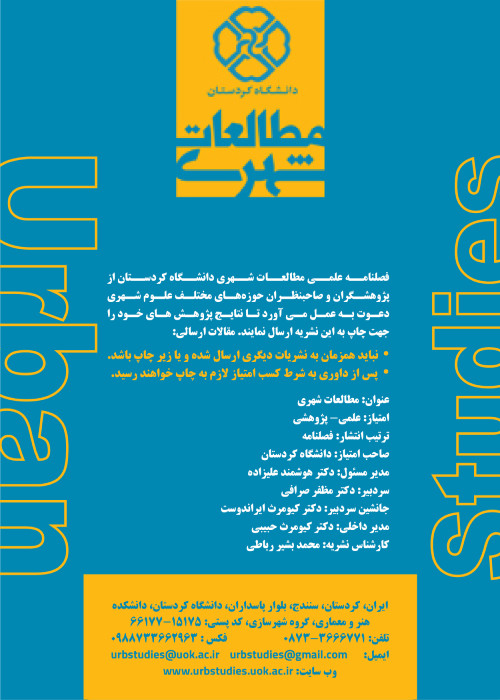An analysis of the conflict of interest in the State in charge of urban spatial planning
Urban space planning is a collective social action concerning decisions on the social use of land; i.e. an action performed by the people’s elected state. Thus, the state is seen as an institution that seeks to realize the public interest and compensate for market failure through legitimate power. However, the fundamental question is whether the state actually functions as a benevolent institution in urban space planning based solely on the public interest of the city. The purpose of this study is to provide an answer to this fundamental question from the perspective of Public Choice Theory, which is focused on the state for analysis and comprehension of the consequences of the interaction between its elements, emphasizing the similarities between people’s choices in market and non-market decisions.The urban planning system in Iran is one of the most complex, comprehensive land use regulation systems with a focus on the government. The conditions of urban development and urban planning in Iranian cities, including the Tehran metropolitan area, well demonstrates urban-planners’ and decision-makers’ lack of concern for the public interests regarding the city in some cases. In an interdisciplinary analysis using components from the theory of positive public choice, this research addresses the decision space in urban planning for the Tehran metropolitan area, and presents solutions to improve the conditions from the normative aspect of the theory.
The state has tried to provide urban public benefits and services through urban planning, and the public interest is used in fact to justify and advocate urban planning interventions. From an ethical point of view, the biggest problem encountered by planners is to adopt the best approach in response to decision-makers and the best action for the public interest, as they are always pressured by government change on the one hand and social change on the other. The public interest has always been important in urban space planning despite its controversial entity. It can play three major roles in that regard: those of legitimizing planning as a state activity, of a norm for planning and professional ethics, and of a criterion for evaluation of planning and plans.Public choice theory focuses on planning as a political activity by identifying state influence and market failure. According to the theory, the state is not regarded as a single entity, but a group of individuals who pursue their personal and group interests, which makes up an important failure of the state. Stakeholders, political organizations, and social classes impose pressure on the state to pursue their own interests, and this can severely affect the efficiency of the state.The main purpose of this study was to measure the effectiveness of the decision space in spatial planning of the Tehran metropolitan area given the components emphasized in the public choice approach and concern for personal and political interests and rent-seeking in choices made by decision-makers.
The methodology of qualitative analysis was first reviewed, and the main indicators concerning each of the relevant components were then obtained based on the data extracted by experts in the field and quantified using the Likert scale. Attempts were made to analyze the impacts of the components of public choice theory on the decision-making carried out for the Tehran metropolitan area planning through application of Structural Equation Modeling using Partial Least Squares in the SmartPLS software.
Since the value of the t-statistic was greater than 1.96, it can be stated that the factors of personal and political interests and rent-seeking had significant negative effects on decision-making in the spatial planning process in the Tehran metropolitan area. The values concerning the paths in the final research model indicated that concern for personal interest pursued with the cost-benefit approach accounted for 21.5% of the changes made in decision-making in urban planning, rent-seeking explained 36.5%, and political interests explained 31.2%. Therefore, the hypotheses proposed in the research were retained.The results of the research demonstrated that the factors with the severest negative effects on the components under examination and decision-making in the process of urban space planning of the Tehran metropolitan area include urban planners’ lack of concern for the feasibility and functionality of plans, collusion between planners, city managers, and landowners to determine and change land use, special privileges granted beyond personal competence to specific individuals and groups, lack of transparency and information, influence of those in power and wealth in the urban planning structure, and urban managers’ prioritization of attempts to maintain their statuses and protect the established power structure, etc.
The findings of this study, conducted among experts aware of the spatial planning system of the Tehran metropolitan area, indicated that the components of public choice theory, including concern for personal and political interests and rent-seeking, have significant negative impacts on decision-making in the spatial planning process. In other words, although it is assumed that the public interest of the city should be considered in the process of urban space planning, other incentives are influential in decision-making, and there is a conflict of interest in practice. Keywords: state, urban space planning, public choice theory, public interest. AcknowledgmentThis article has been extracted from a Ph.D. thesis on urban planning entitled The Role of State and Market in Urban Spatial Development Planning of Iran, defended by the first author under supervision of the second at Shahid Beheshti University, Tehran.
- حق عضویت دریافتی صرف حمایت از نشریات عضو و نگهداری، تکمیل و توسعه مگیران میشود.
- پرداخت حق اشتراک و دانلود مقالات اجازه بازنشر آن در سایر رسانههای چاپی و دیجیتال را به کاربر نمیدهد.


